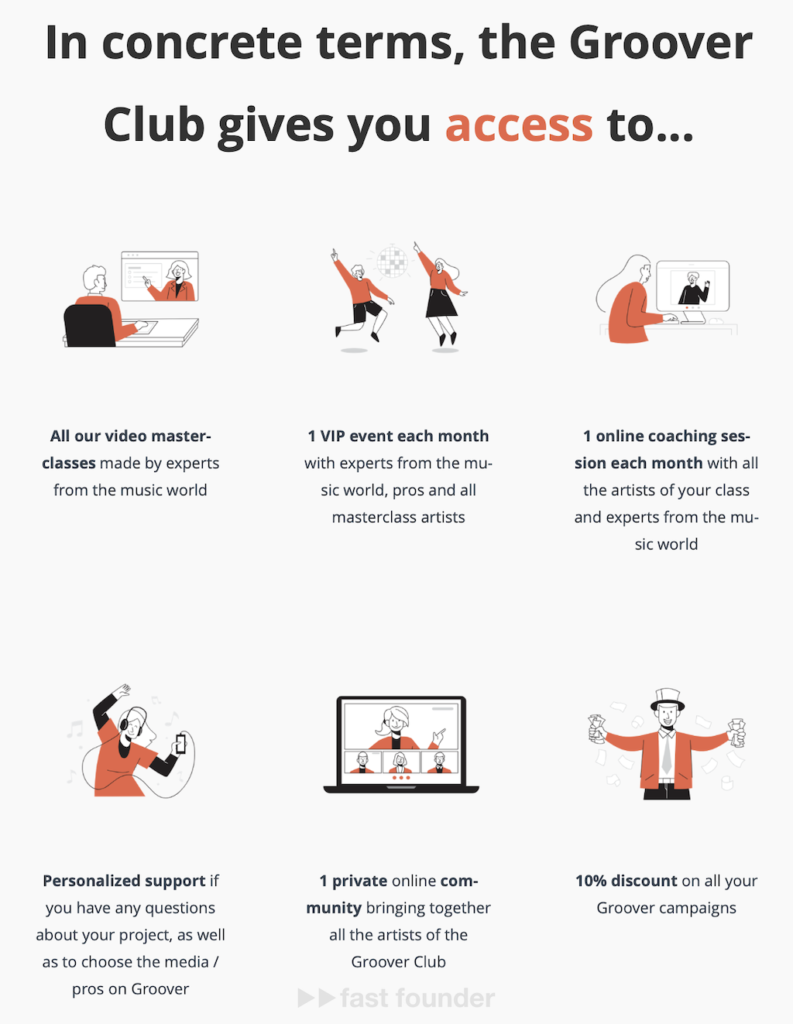- The traditional model of fixed prices for online courses is unfair for both students and teachers! After all, the cost of online education essentially boils down to the cost of feedback.
- Smart students need less of it, while those unable or unwilling to learn need more. Therefore, smart students should pay less for education, while others should pay more. And teachers should earn more from those on whom they spend more time.
- This is a very interesting idea. What’s even more interesting is that such models have already begun to be implemented. For example, with this startup:
Project Essence

Groover offers musicians the opportunity to “promote their music and get results from it.”

In reality, through the service, musicians can submit their compositions to music experts who listen to these compositions and provide feedback on them.

The experts include professional musicians, music journalists, music channel curators, producers, music label editors, and other individuals involved in discovering new talent. The service currently has nearly 3,000 such experts.

Although formally Groover only promises to provide feedback, in fact, the main goal of musicians sending their tracks is to attract the attention of people who could influence their musical future.
At worst, they’ll explain why they’re not interested in promoting this music yet, and at best, they’ll make specific offers — play the track on a music channel, perform at a concert, or even sign a contract with a label.
When submitting their tracks, musicians select specific experts who understand their type of music and/or who, in the musician’s opinion, can help with its promotion. At one time, a musician can submit their tracks to several experts at once.

Exactly how many depends only on how much they’re willing to pay 😉 One feedback from one expert costs 2 euros, with a minimum of 15 words of feedback. If the expert does not respond within 7 days, the payment is refunded to the musician’s account on the service.
Of these 2 euros, 1 euro goes to the expert, and 1 euro goes to Groover itself.

For experts, this is not such a serious source of income, their main interest is in finding new promising musicians. However, every effort — even in filtering the incoming flow of applicants — must be paid 😉

The startup writes that “over 100,000 musicians use Groover to promote their music.” Articles about the service state that during the existence of the service, launched in France in 2019, 350,000 musicians from 180 countries around the world have submitted their compositions to receive feedback — for which they have received a total of 4 million reviews.
Musicians from the USA, Canada, Italy, Brazil, the UK, Germany, and the startup’s home country, France, are particularly active on the service. For all other countries except France, 80% of the service’s revenue comes from, with half of that coming from musicians from the USA.
I first noticed Groover at the end of 2021. But since then, the startup has added two new things.

The first new thing is the “Groover Club.” In this club, musicians have access to video recordings and live broadcasts of educational masterclasses, the opportunity to participate in one event and one coaching session per month, a chat for communication with other club members, as well as a 10% discount on feedback services through Groover.

The cost of participation in the club ranges from 44 to 59 euros per month depending on the payment term. If you pay for a year in advance, it’s the cheapest option.

The second new thing is the Groover Obsessions music accelerator, to participate in which you still need to pass a selection process to become one of the “promising musicians” for whom the accelerator is intended.

The accelerator’s task is to help musicians release new tracks. The accelerator promotes released tracks through its channel on Spotify and other available promotion channels.
Currently, 300 musicians are participating in the acceleration program, some of whom are already professionals.

The participation conditions in the accelerator are not specified on the website. However, right below the call to register to participate in the accelerator are the standard rates for receiving feedback — which gives the impression that even during the accelerator, its participants must pay if they want to receive feedback from the accelerator’s curators 😉
Groover has now raised an additional $8 million in investments, increasing the total project investment to $16.5 million.
What’s Interesting
Groover claims that every day in the world, 120 thousand new songs are released. This number seemed too big to me, so I decided to check.

The authoritative music magazine Billboard generally agrees with this — estimating that in 2023, more than 100 thousand tracks were uploaded to the internet daily.
A significant portion of these tracks undoubtedly belong to aspiring musicians. And this doesn’t even account for aspiring musicians who simply want to make it happen.
Thus, the number of those willing to receive feedback during the creation of new songs can be considered large enough to want to earn money from it 😉 So, there’s a real potential market for services like Groover. Moreover, it’s large enough for many to make a living from.

In this context, we can recall the startup Studio, which I wrote about a couple of weeks ago. It’s a website with video tutorials on various topics, including music.
And quite recently, this startup also launched an accelerator for musicians, the goal of which is formulated as “create and release one new song per month.”

The cost of participating in this accelerator is $199 per month or $1,799 per year.
The first important conclusion is that educational programs should be launched to achieve specifically formulated goals, such as releasing one song per month, and not just to “learn” something. Learning is just what’s needed to achieve this goal 😉
The second important question concerns what people lack most when they want to learn something to achieve a specific goal.
The thing is, there’s almost an overload of educational materials on the internet on almost any topic. So, the problem now is definitely not the availability of educational materials, and not even their quality — because there’s plenty of quality material out there too.
But what’s really lacking is feedback during the learning process. However, it’s not right to call the desire to “receive feedback” — when a student simply wants someone to chew up and spoon-feed them something from these educational materials. Because they didn’t have the time to read/listen or the elementary diligence to understand it ☹️
For Groover, for example, the minimum length of feedback is 15 words! That’s definitely not enough for spoon-feeding. But for feedback “as in real life” — it may well be sufficient.
However, the problem is that any feedback requires the time and effort of the teacher or expert. And they spend most of their time during someone’s learning process on this. In other words, feedback is the main item of expenditure for the organizer of the educational process.
At the same time, the traditional model of payment for education is fixed, implying a certain ceiling for feedback, which is included in this price, and is distributed across all students in one cohort. And the sad thing is that almost all this time is consumed by those who are incapable and unwilling to learn, who demand to be “chewed up and spoon-fed.”
From here, you immediately want to make a cool conclusion that the ideal model of education is when the educational content itself is delivered for a fixed fee (or even for free), but for each “feedback” from the teacher, the student must pay. As a result, the “smart” ones will pay less for education, and the “foolish” ones will pay more 😉
But Groover Club and Groover Obsessions implement exactly this business model! Membership in the Groover club, including a fixed number of activities, costs a fixed amount of money. And feedback on the songs created during the learning or acceleration process — already costs separate money, proportionally to the desired amount of this feedback. With a price tag of 2 euros for 15 words 😉
Where to Run
Actually, an interesting direction for possible movement lies precisely in the implementation of such an “ideal” business model of education:
- The educational goal is not to “learn” but to achieve concrete results.
- Educational content and common activities are for fixed fees or even for free.
- Feedback during the learning process is for separate fees, proportional to the amount of feedback.
Initially, I wanted to write that the feedback provided by AI assistants, not live instructors, should be included in the fixed cost of education. But then I thought that since you have to pay for each call to AI engines like OpenAPI, fixed prices are clearly not ideal here. Although in this case, feedback from AI assistants can be tariffed at much lower rates than feedback from live people 😉
So, in which area do you want to launch an education program based on such an “ideal” business model? What results should the students achieve? What educational materials and common activities are needed for this? What kind of AI assistant should be made for this?
And most importantly, what prices will you set for: a) educational materials and common activities, b) feedback from AI assistants, and c) feedback from live people?
About the Company
Groover
Website: groover.co
Last funding round: $8M, 13.02.2024
Total investments: $16.5M, rounds: 4
